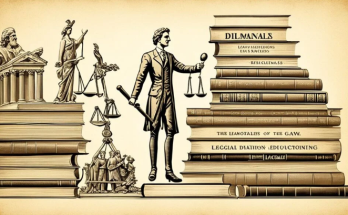Introduction
Understanding the Attorney-Client Relationship, The lawyer client relationship is a foundation of the overall set of laws, laying out the establishment whereupon trust, classification, and powerful portrayal are fabricated. This special relationship is basic to guaranteeing that clients can look for legitimate and informed lawful guidance, with the certainty that their advantages are being safeguarded. This article dives into the vital components of the lawyer client relationship, including classification, honors, and the moral obligations lawyers owe to their clients.
What is the Lawyer Client Relationship?
The lawyer client relationship is an expert connection between an attorney and their client, shaped when a client looks for legitimate help and the lawyer consents to address them. It is based on common trust and secrecy, permitting clients to unreservedly impart data to their lawyer, who thus gives legitimate exhortation and portrayal custom fitted to the client’s necessities. This relationship envelops different lawful and moral norms intended to safeguard the two players and keep up with the trustworthiness of the legitimate interaction. Understanding the Attorney-Client Relationship.
Key Components of the Lawyer Client Relationship
1. Classification and the Obligation to Safeguard Client Information
Privacy is one of the most principal parts of the lawyer client relationship. Lawyers are legitimately and morally committed to keep all client correspondences hidden, guaranteeing that delicate data uncovered by the client stays secured. This obligation is significant for building trust, as the need might arise to have a real sense of safety while examining individual, monetary, or generally delicate issues with their lawyer. Understanding the Attorney-Client Relationship.
- Extent of Confidentiality: The lawyer’s obligation of secrecy reaches out past case-related matters; it incorporates all data unveiled by the client, whether or not it relates to the case. This guarantees clients can share important data unafraid of unapproved exposure.
- Exemptions for Confidentiality: In specific circumstances, privacy might be restricted. For instance, lawyers are for the most part allowed, and once in a while expected, to uncover data on the off chance that it forestalls a future wrongdoing, safeguards an individual from up and coming mischief, or when commanded by court request.
2. Lawyer Client Privilege
Legal right to confidentiality is a lawful rule that safeguards correspondences among clients and their lawyers from being unveiled in judicial procedures. This honor guarantees that lawyers can’t be constrained to affirm or share private client data in court, permitting clients to talk straightforwardly without worry that their words will later be utilized against them.
- Extent of Privilege: The honor commonly covers all types of correspondence, whether spoken, composed, or electronic, for however long they are made in certainty and to look for legitimate counsel.
- Constraints of Privilege: Legal right to confidentiality can be postponed by the client, either unequivocally or by including outsiders in the correspondence. Moreover, the honor doesn’t matter in the event that the client looks for lawful counsel to additional a wrongdoing or misrepresentation.
3. Guardian Obligation and the Obligation of Loyalty
Lawyers have a guardian obligation to act to the greatest advantage of their clients. This obligation of reliability implies that lawyers should focus on their client’s advantages over their own and stay away from clashes that could disrupt powerful portrayal.
- Keeping away from Clashes of Interest: Lawyers should keep away from circumstances where their portrayal of one client may adversely influence another client or make a private matter of interest. For instance, a lawyer addressing two clients with restricting interests in a similar case would disregard the obligation of reliability.
- Full Disclosure: On the off chance that a potential struggle emerges, lawyers are expected to uncover it to the client and get assent prior to proceeding with portrayal. This straightforwardness is fundamental for keeping up with trust and safeguarding the honesty of the lawyer client relationship.
4. Obligation of Competence
Lawyers are expected to give capable portrayal to their clients, which incorporates the important information, abilities, and arrangement to really deal with legitimate issues. Capability includes remaining refreshed on lawful turns of events, directing intensive exploration, and completely grasping the client’s exceptional circumstance.
- Legitimate Information and Skills: A lawyer should have a comprehension of important regulations, points of reference, and procedural principles relevant to the case. Capability likewise reaches out to commonsense abilities, like exchange and case the board.
- Proceeded with Learning: Lawyers are supposed to satisfy proceeding with legitimate schooling (CLE) necessities to guarantee they stay proficient about changes in the law, especially in their space of training.
5. Correspondence and Transparency
Powerful correspondence is imperative to the lawyer client relationship. Lawyers should keep their clients informed about case progress, make sense of perplexing legitimate ideas plainly, and be accessible to address questions. This cultivates a cooperative climate, guaranteeing clients are enabled to pursue informed choices.
- Normal Updates: Lawyers are liable for refreshing clients on critical case improvements, cutoff times, and any difficulties that might emerge.
- Clear Clarification of Legitimate Matters: Lawyers ought to find opportunity to make sense of lawful ideas, methodologies, and likely results in an available way, permitting clients to comprehend the ramifications of their choices completely.
Laying out and Keeping up with the Lawyer Client Relationship
1. Starting Discussion and Commitment Agreement
The lawyer client relationship normally starts with an underlying meeting, during which the lawyer surveys the client’s requirements, makes sense of their administrations, and talks about charges. Assuming the two players choose to continue, they will go into a commitment understanding or retainer, which frames the extent of portrayal, lawful expenses, and other significant terms.
- Extent of Representation: The commitment arrangement ought to indicate the lawyer’s liabilities, explaining the errands they will deal with for the client. This forestalls errors about the extension and cutoff points of the lawyer’s inclusion.
- Expense Arrangements: Lawyers might charge hourly, on a possibility premise, or a level expense, contingent upon the idea of the case. Straightforward conversation of charges keeps away from questions and encourages trust.
2. End of the Lawyer Client Relationship
The lawyer client relationship might be ended in different conditions, either by common understanding, at the client’s solicitation, or on the other hand on the off chance that the lawyer is expected to pull out. Circumstances where end might happen include:
- Client Dissatisfaction: Clients reserve the privilege to end the relationship on the off chance that they are disappointed with the lawyer’s administrations or wish to employ another lawyer.
- Withdrawal by Attorney: Lawyers might be constrained to pull out from a case on the off chance that they face an irreconcilable circumstance, absence of capability in the branch of knowledge, or on the other hand assuming that the client demands deceptive or unlawful activities.
- Finish of Representation: The relationship commonly closes once the case is settled, however lawyers are much of the time still accessible for post-case discussions or follow-up issues depending on the situation.
Why Trust is Fundamental in the Lawyer Client Relationship
Trust is the groundwork of any effective lawyer client relationship. Clients should feel sure that their lawyer is focused on upholding for their benefit, giving equipped counsel, and safeguarding their inclinations. Trust takes into consideration open correspondence, empowering the lawyer to completely figure out the client’s necessities and to in like manner tailor their portrayal.
- Client Cooperation: When clients trust their lawyer, they are bound to coordinate completely, giving important data and heeding their lawyer’s direction. This coordinated effort can fundamentally work on the possibilities of an ideal result.
- Lawyer Accountability: Lawyers, thus, are responsible to their clients, holding themselves to exclusive requirements of incredible skill and straightforwardness. This responsibility reinforces the relationship and upgrades the lawyer’s capacity to address their clients actually.
Conclusion
The lawyer client relationship is a one of a kind bond described by secrecy, dedication, and a pledge to moral norms. Lawyers assume a crucial part in prompting clients, upholding for their inclinations, and guaranteeing that their privileges are safeguarded inside the overall set of laws. By keeping up with clear correspondence, safeguarding client secrecy, and maintaining proficient principles, lawyers encourage trust and engage clients to explore legitimate difficulties with certainty.



